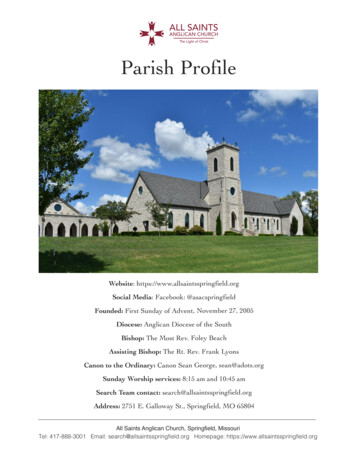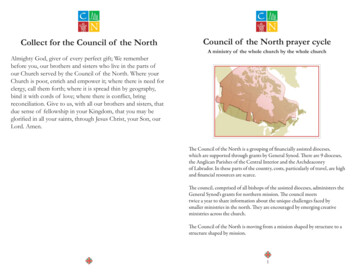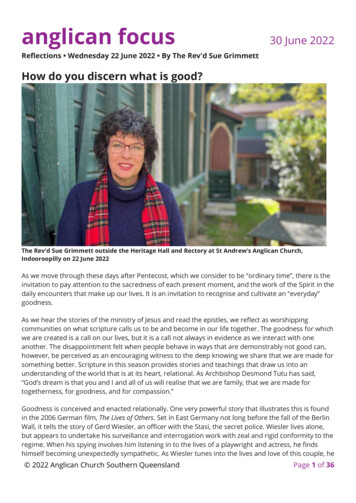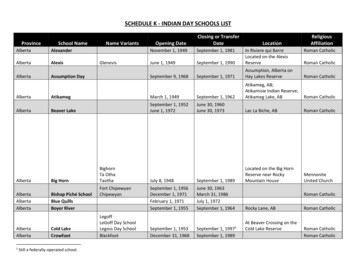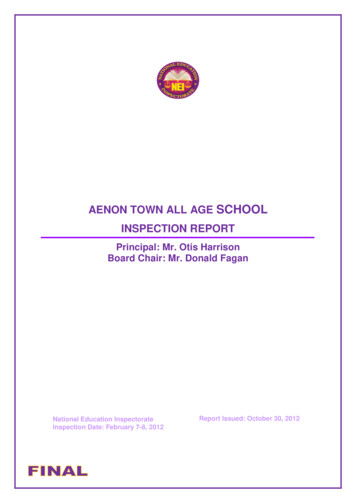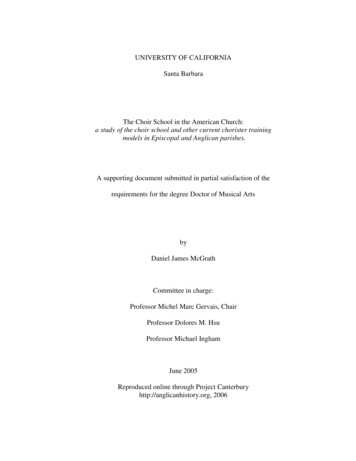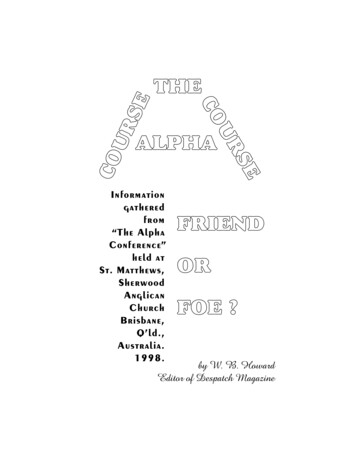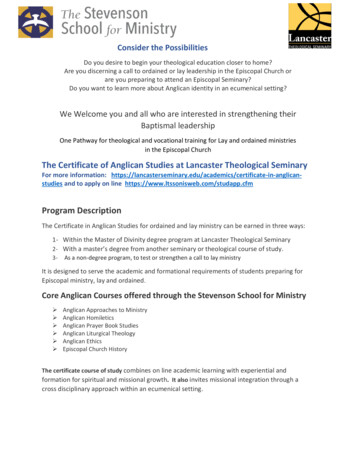
Transcription
Consider the PossibilitiesDo you desire to begin your theological education closer to home?Are you discerning a call to ordained or lay leadership in the Episcopal Church orare you preparing to attend an Episcopal Seminary?Do you want to learn more about Anglican identity in an ecumenical setting?We Welcome you and all who are interested in strengthening theirBaptismal leadershipOne Pathway for theological and vocational training for Lay and ordained ministriesin the Episcopal ChurchThe Certificate of Anglican Studies at Lancaster Theological SeminaryFor more information: e-in-anglicanstudies and to apply on line https://www.ltssonisweb.com/studapp.cfmProgram DescriptionThe Certificate in Anglican Studies for ordained and lay ministry can be earned in three ways:1- Within the Master of Divinity degree program at Lancaster Theological Seminary2- With a master’s degree from another seminary or theological course of study.3-As a non-degree program, to test or strengthen a call to lay ministryIt is designed to serve the academic and formational requirements of students preparing forEpiscopal ministry, lay and ordained.Core Anglican Courses offered through the Stevenson School for Ministry Anglican Approaches to MinistryAnglican HomileticsAnglican Prayer Book StudiesAnglican Liturgical TheologyAnglican EthicsEpiscopal Church HistoryThe certificate course of study combines on line academic learning with experiential andformation for spiritual and missional growth. It also invites missional integration through across disciplinary approach within an ecumenical setting.
Participate in this on-line approach that can be pursued as a stand-alone program orconcurrently with the Master of Divinity Degree or the Master of Arts in Ministry and Leadership atLancaster Seminary.The certificate requirements 24 academic credits as outlined in the course listing below. All courses are 10 weeks.o Four 3-credit courses, which are offered online since Covid 19. Usually they are offeredin residence.o Six 2-credit courses, which are offered only online. Noncredit requirementso Complete Racial Justice Institute I or II through Lancaster Theological Seminary orBecoming the Beloved Community through The Dean T. Stevenson School for Ministry.Complete the Safeguarding God’s Children and God’s People training through The Dean T. StevensonSchool for Ministry, click here for more childrenandgodspeople/Learning OutcomesStudents enrolled in this program are expected and prepared to: Encounter and engage theological disciplines in order to contribute to contemporary modes ofthinking and community building while being formed and strengthened in vocational identity; Enhance practices of ministry through focused skill development, integrating theology withpraxis for the purpose of preparing capable leadership to serve the 21st century church inAnglican ministry settings; Develop a lifelong commitment to individual and communal spiritual practices within theAnglican tradition rooted in faith, hope, love, and justice; Articulate a coherent theological understanding of God’s mission grounded in Scripture,tradition, and reason particularly in its Anglican distinctiveness.Lancaster Theological Seminary Required courses are presently offered online for2020-2021 academic year, (usually residential) (9 credits total)LTS Required Courses 9 credits total, these courses are a part of the LTS MDiv. program TH101 Intro to TheologyThis course explores the theological task, which is the self-critical and creative reflection of Christians ontheir forms of worship, confession, witness and moral action.
ET100 EthicsEthical reflection as it evolved within the churches concerns activities directed toward other creatures,particularly humans. Rigorous (and sometime rancorous) ethical debate has developed withinChristianity because there has never been a consensus or even clarity concerning the proper way to lovethe neighbor. IS240 Living Christian Movements (1)The focus will be on the way these different visions of Christianity were and are enacted in the lives ofordinary people. The sweep will be global, considering the ways in which local cultures affect the shapeof the Christian faith and mission.LTS Elective residential courses (3 credits total): IS260 Making DisciplesStudents will develop and practice three skills: 1) teaching the good news Jesus proclaims in the gospelsand how congregations might continue his mission, 2) analyzing and adapting congregational practicesso they proclaim Jesus’ good news more clearly, build trust in God, and welcome new members, 3)conversing about their personal experience and understanding of God’s goodness with people who doand do not already follow Jesus. IS210 Church & Social ChangeThis course taps the resources of the Christian tradition (andbeyond the Christian tradition) for motivating and sustainingsocial activism. It helps students develop congregation-basedstrategies to overcome local/global disparities and structuralsin.From the Stevenson School forMinistry- 6 on line coursesPL229 Anglican Approaches toMinistrySummer Term (Online)2 creditsThe core principle of this course is formation in themethodology necessary to follow the “Anglican Way.” Toengage students in the way of life for all the baptized and theuniversal call to ministry in relationship to their specific call andrespective order in the Episcopal Church. This course willengage in the transformational dimensions regarding ministryin the Episcopal Tradition: vocational identity (personal andcommunal), sources of and participation in authority, andmissional outcomes and means of delivery.WP220 Anglican HomileticsSummer Term (Online)2 creditsThis course is designed both for the student preacher and theexperienced preacher. Preachers are called to proclaim theGood News of Jesus Christ no matter the circumstances. Howdo we proclaim this Good News in challenging times from theAnglican/Episcopal tradition? In this course, we will discuss
three types of challenging sermons: liturgical, pastoral, andprophetic sermons. Students will preach three times,videotaping themselves and the class will discuss the sermonsvia Zoom. Therefore, access to a digital recorder and awebcam/microphone will be required. An introduction topreaching course and a year of scriptural studies that includean exposition of exegetical methods are prerequisites for thiscourse.WP222 Anglican Prayer Book StudiesTerm 1 (Online)2 creditsThis 10-week course will provide students with an overview ofthe history of liturgy in the western church, Anglican Tradition,with an emphasis on the liturgical theology of the Book ofCommon Prayer, Baptism and Eucharist along with the DailyOffice.TH228 Anglican Liturgical TheologyTerm 1 (Online)2 creditsIn this 10-week module, we will discuss the nature of liturgicaltheology as a source of theology for the church. Liturgicalscholars have coined the term lex orandi, lex credendi todescribe how the liturgy functions as a source of theology.Some liturgical scholars consider liturgical theology to be“primary theology.” We will consider the implications of thisassertion as well.ET210 Ethics in the Anglican TraditionTerm 3 (Online)2 creditsOver 10 weeks, we will explore a range of topics that addresshow Christians, Anglican/ Episcopal Christians can think andlive morally – in our own lives and in our common life together:in families, in communities, in our nation, and in creation. Thiscourse will also include an exploration of the Canons of theEpiscopal Church. We shall set canon law in its various contextsof law, theology (especially ecclesiology) and the practicaloperation of the Church in its life and work of loving andserving the Lord in this world, thus seeking to address pastoralimplications throughout.CH220 History of the Episcopal Church This is a course in the basic history of the Episcopal Church. WeTerm 3 (Online)will begin with a consideration of the planting of colonial2 creditsAnglican churches and the struggle for stability and identity,especially in the wake of the American Revolution. Each week,in a linear sequence, we will read from Richard Prichard’s “AHistory of the Episcopal Church.” The course will conclude witha decade of renewal (1980-90) and some reflection ondirections and developments, which continue to shape ourChurch of the present.
Additional program requirements:1. Becoming the Beloved Community through The Dean T.Stevenson School for Ministry or the Racial Justice Institutethrough Lancaster Theological Seminary.2. Safe Guarding God’s Children and God’s People trainingthrough The Dean T. Stevenson School for Ministry.
respective order in the Episcopal Church. This course will engage in the transformational dimensions regarding ministry in the Episcopal Tradition: vocational identity (personal and communal), sources of and participation in authority, and missional outcomes and means of delivery. WP220 Anglican Homiletics Summer Term (Online) 2 credits



